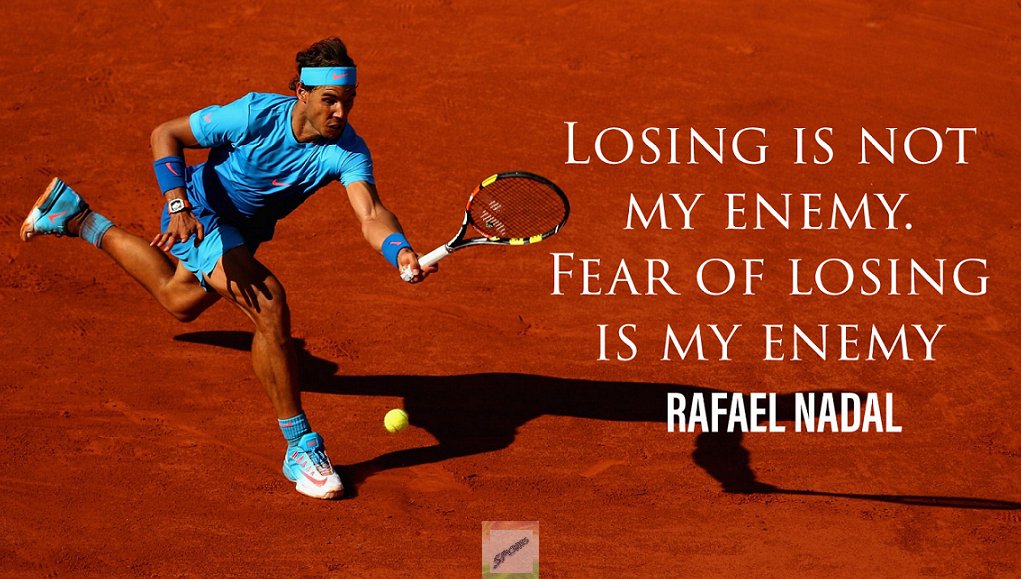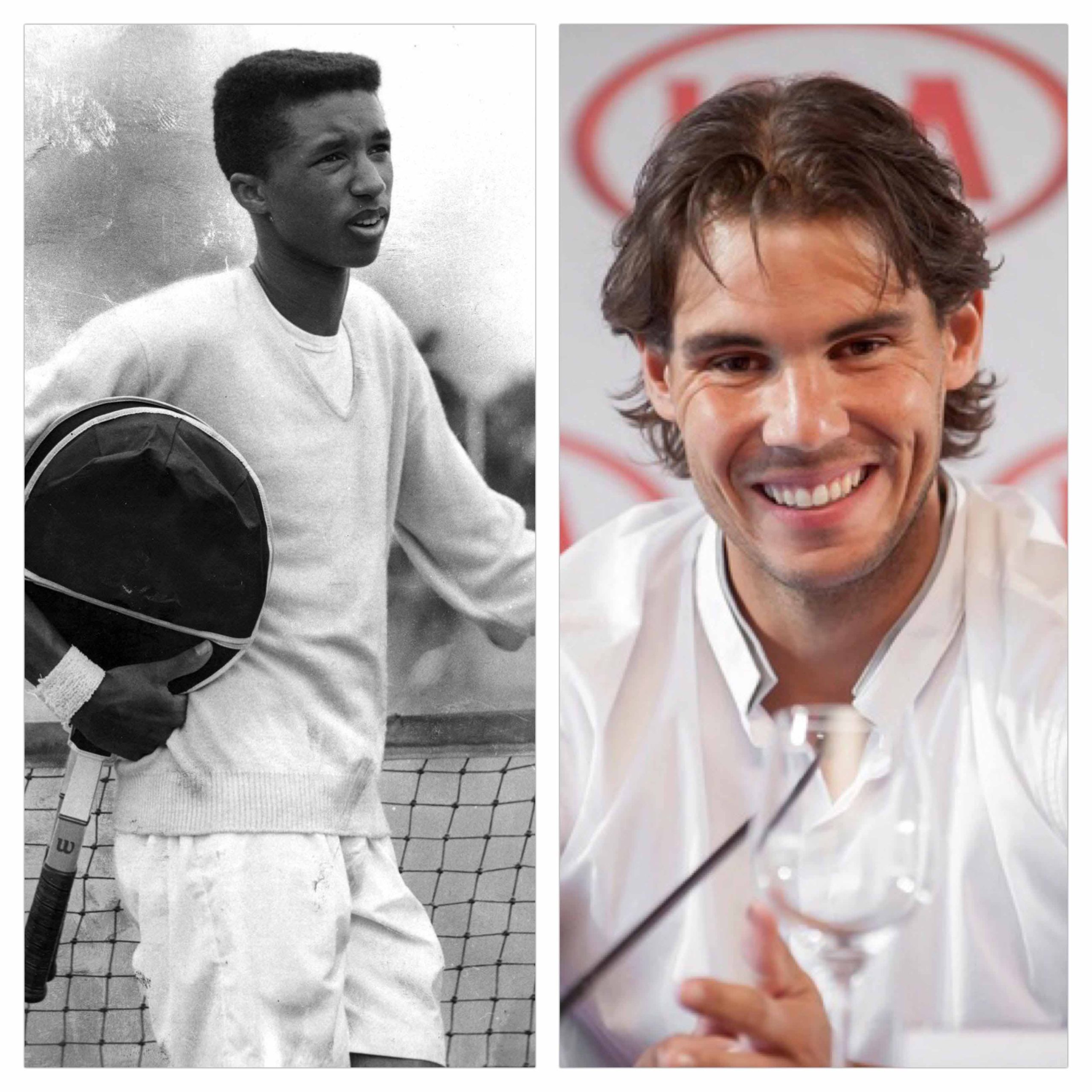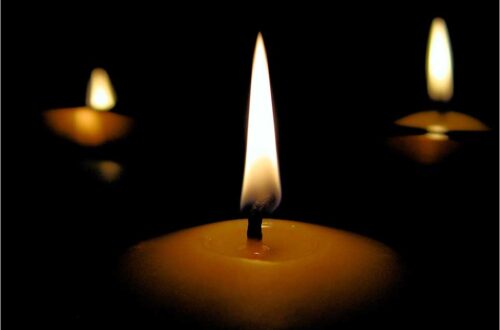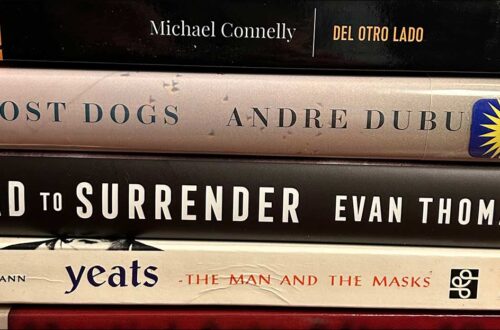In a corner of my garage I do tennis-specific workouts, and I have done these for years. I have on the walls some photographs of myself after after having won tournaments, or other such important competitive moments. More importantly, I have some quotes posted there that I have particularly important and which I constantly want to be reminded of – quotes to live by.
And there is one of them in particular that I think about all the time. Here is the quote in my own handwriting tacked onto the wall, by the great champion Arthur Ashe –
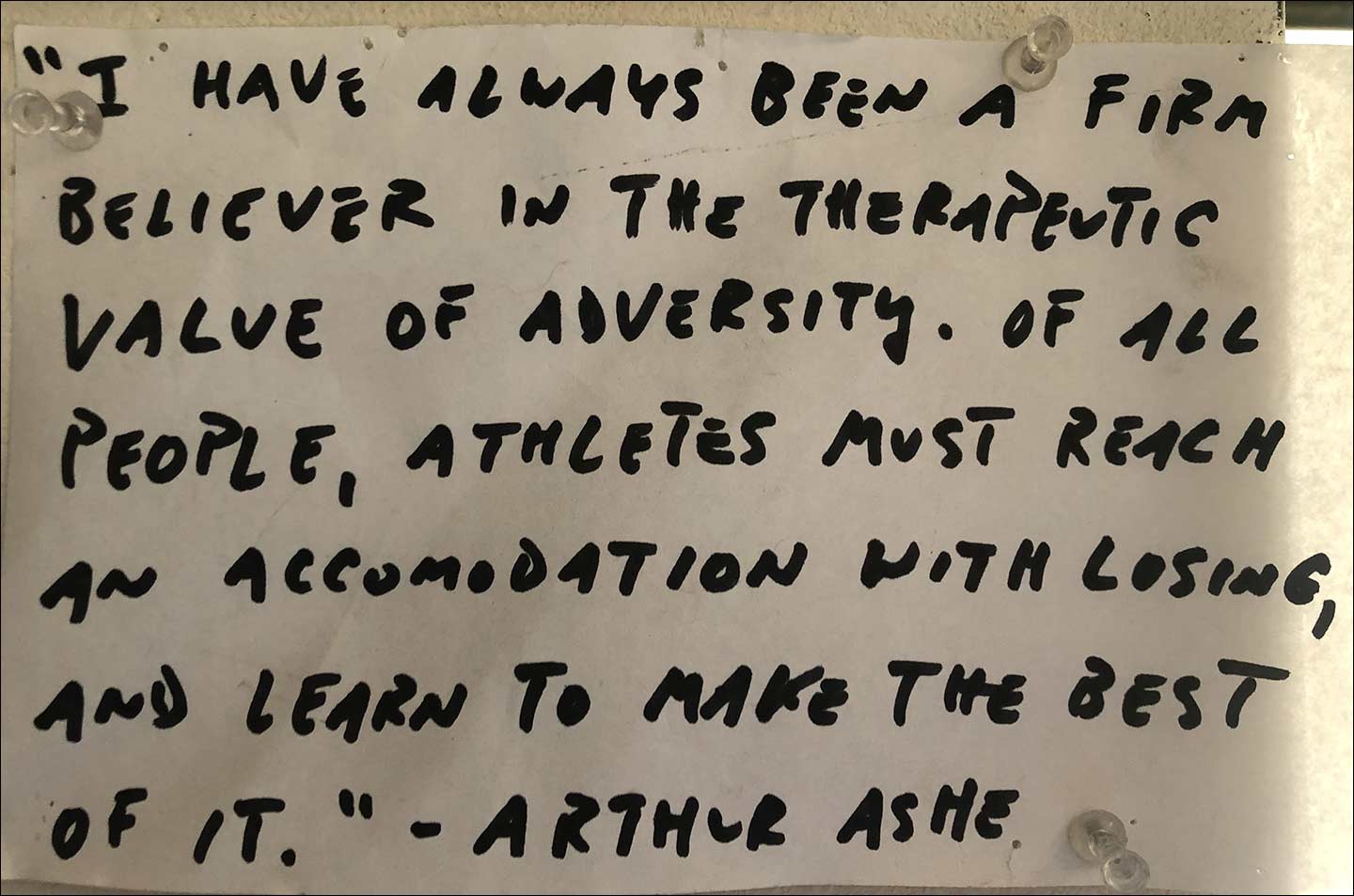
Ashe was only about four times more literate and thoughtful than your average tennis champion, as his words show, and his observation proves true far beyond the world of sport. It is wisdom which can benefit everyone. Ashe is talking about adversity, in general. But for athletes in particular, he is talking about physical injuries and competitive losses. Especially the losses.
The problem is this: it hurts to lose. To put your everything into an athletic endeavor – to leave it all on the court, and to come up short at the end – this can be devastating. Especially at the highest levels, where there is so much at stake. I seem to remember reading about Rafael Nadal and Roger Federer crying for half an hour straight in the shower after they lost in the Wimbledon Finals in 2007 and 2008 respectively. They had reason to cry. I am sure the pain of the loss was sharp and cutting to the core.
But temporary, too. Although maybe somewhere the pain is still there for them.
“Everyone loses,” I remember Nadal deadpanned this response, when after a long winning streak a journalist asked him if Rafa would ever lose again. Nadal obviously thought the question was stupid. EVERYONE LOSES. Even Nadal, among the best of the best, loses. And he loses relatively often. He knows that. (At the time of this writing Rafa has 1,048 wins and 210 losses in his pro career.) And Nadal makes the best of it. Why? Because he is a champion and because he has a good attitude. We can’t learn much from the technical expertise of professional tennis players like Rafa, as they are almost playing a different sport than we recreational players are. But we can learn a lot from their mental approaches to competition and the mindset they employ.
In fact, as I tell any athlete on my team, the road to winning runs through losing, for professionals or anyone else. To be more specific, one gets better by competing against players a bit better than yourself and losing to them. Then you can identify exactly why you lost, how they are better than you, where your shortcomings are – and then focus on improving. If you work hard enough to become a better player through careful practice with a plan, soon you will be beating those players who used to beat you. Focus not so much on winning now but in getting better over time.
In this, EGO IS THE ENEMY, as in so much else.
Because it hurts to lose.
We come up against a better player and lose, with your pride dragged into the dirt and your ego deflated. It does not feel good. We tend to take losses personally.
This can be a mistake, in my opinion.
If you are winning all the time, are you playing good enough competition? And if you are beating up on lesser players, are you really getting any better? Is going undefeated against your competitive inferiors anything to feel proud about?
It is a good idea to try to separate the competitive loss from your value as a human being. You might have lost a match, but that does not mean you are a loser; you do the best you can on the court, and you walk off with your chin held high, win or lose. That is what I always try to do. I hope to have the same positive attitude on the court, whether I am winning or losing. I try to make it impossible for a spectator to determine whether I am winning or losing by my body language. Always keep it positive.
Of course, this is easier to say than to do. Any solid athlete worth their salt has steel in their spine with regards to mental strength needed in competition. They will fight you to the end. They won’t lose; you will have to beat them. The competitive fire burns brightly inside them.
But they also won’t throw a tantrum if they lose. They have lost a lot in their lives, most likely, especially if they are really good. If they have learned how to win, they have also learned how to lose – and hopefully how to lose with class.
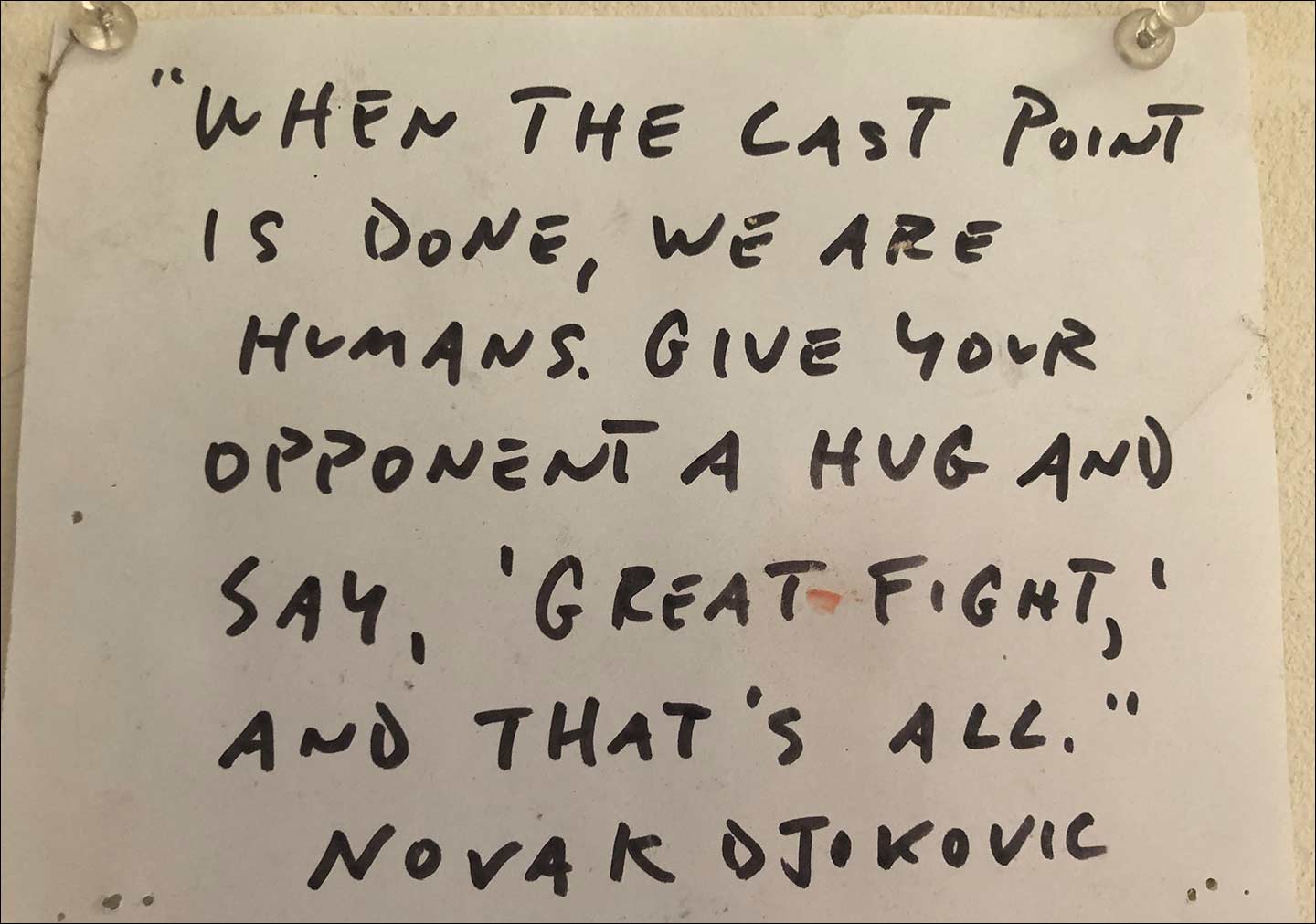
There is a reason people look down on “poor losers.” Maybe learning how to lose is a lesson sport teaches you that is as important as how to win. “EVERYONE LOSES.” Don’t be a pissy whiner like John McEnroe, the type who obviously enjoys winning less than they absolutely despise losing. To hate losing more than you like winning is to take a lot of the fun and joy out of the athletic endeavor. The idea that anyone else, no matter how talented and skilled, might manage to emerge victorious against you rankles your pride. “How dare they!” As in so many other things: EGO IS THE ENEMY. It is ridiculous. As Nadal says, “Losing is not my enemy. Fear of losing is my enemy.” This is subtle but important point, in my opinion. There is no shame in playing your hardest and losing. Do your absolute best on the court and shake hands at the end of the match, and then go home and sleep the sleep of the virtuous. Control what you can control, and let the rest go.
Some time ago I was talking with a 15-year old girl who was badly losing a tennis match against a clearly superior player. I told her she was going to lose, and that it was OK. “Give her as best a match as you can and keep your chin up.” I could tell her pride was wounded, as she was embarrassed at the beat-down scoreline. She was getting blown off the court. If she were older (and male), or I were talking to myself, I would have told her to “take her beating like a man.” (What else can you do?) After the match was over I urged her to try not to take the match so personally. I reminded her that opponents like this will compete against players who will in turn beat them 6-0, 6-0. And those girls will lose in like fashion to higher-level players, too — and on and on and on. EVERYONE LOSES. The key is to try and learn from your losses and always seek to get better. That is all you can do. Allowing your vanity to bring you to a place where you take grave personal offense after a defeat is a mistake. EGO IS THE ENEMY. It might be beyond your ability right now to beat an opponent who has a superior tennis game. But it is totally within your power to play your best and to lose with dignity. “You might lose a tennis match,” I told this high school player, “but don’t let anybody beat you.” There is a subtle difference. It is an important mindset distinction.
You could tell yourself that your opponent is a sworn enemy against whom you must wage scorched-earth war. This is how world class a-holes like John Mcenroe and Jimmy Connors find the combustible high-octane jet fuel which powers their high-power competitive jet engines. But that source of dark energy is exhausting to the soul and ultimately self-defeating, in my opinion. It is better to look at your opponents – especially if they are better players – as an indispensable means to help you to understand your weaknesses so as to enable you to improve. Your opponents are your teachers. Be thankful to them. McEnroe esteemed Bjorn Borg so much because their rivalry enabled him to play his best tennis, if he wanted to win; he never did find someone else to push him quite like Borg did. Other players did not necessarily bring out McEnroe’s best tennis and his game suffered when Borg retired suddenly at an early age. Same with Nadal and Federer, or Nadal and Djokovic: they need their rival. It is how they are able to lift their tennis games to the highest possible levels. Yet if your rival can usually beat you, there is probably a reason. And if you focus on getting better after they beat you, if you commit to putting in the “hard yards” in training to get better, then soon you might be beating them most of the time. No defeat is forever, and a victory today guarantees nothing tomorrow.
What else are you going to do? Nurse your grievances? Let the bad feelings fester? Become a “glass half empty” person? I think it best to try to learn whatever lesson can be learned from a defeat, especially a bitter one, and then let it go. You are more than any one tennis match, and even a bad loss does not define who you are as a person. Even if today was a disaster and you are left with the taste of ashes in your mouth, there will be more matches and tournaments coming right up. Try not to take it too personally and remember EGO IS THE ENEMY. Let the loss roll off you like rain off a duck’s back. Employ some selective short-term memory loss. EVERYONE LOSES. Why are you any different? A defeat can be a teacher, too. And maybe your bitter defeats are especially the ones which are important and valuable teachers. Take your losses in this spirit and try to be grateful. You are playing a sport with a ball for fun. You are not slaving away on a chain gang in punishment. Be appreciative you were able to play tennis today, and enjoy the sun on your face and the wind in your hair. If today sucked on the court, tomorrow will be different. Bad days happen. (So do good ones.)
So I will repeat my mantra: The road to winning runs through the crucible of losing. Or to be more specific: The road to winning eventually is through losing often and then learning and improving. The process of long-term improvement is more important than short-term results. It is the process that counts.
Today my USTA tennis team has our celebratory party after winning the Ventura County championships for the fourth straight season. The better players on the team are widely known in the local tennis community as solid high-level players, and they bring decades of competitive match experience with them onto the court. We are always the team to beat, the favorite to win; it is not for no reason. The win-loss ratio speaks for itself. That is the thing about competitive sports: the numbers don’t lie. Here we are –
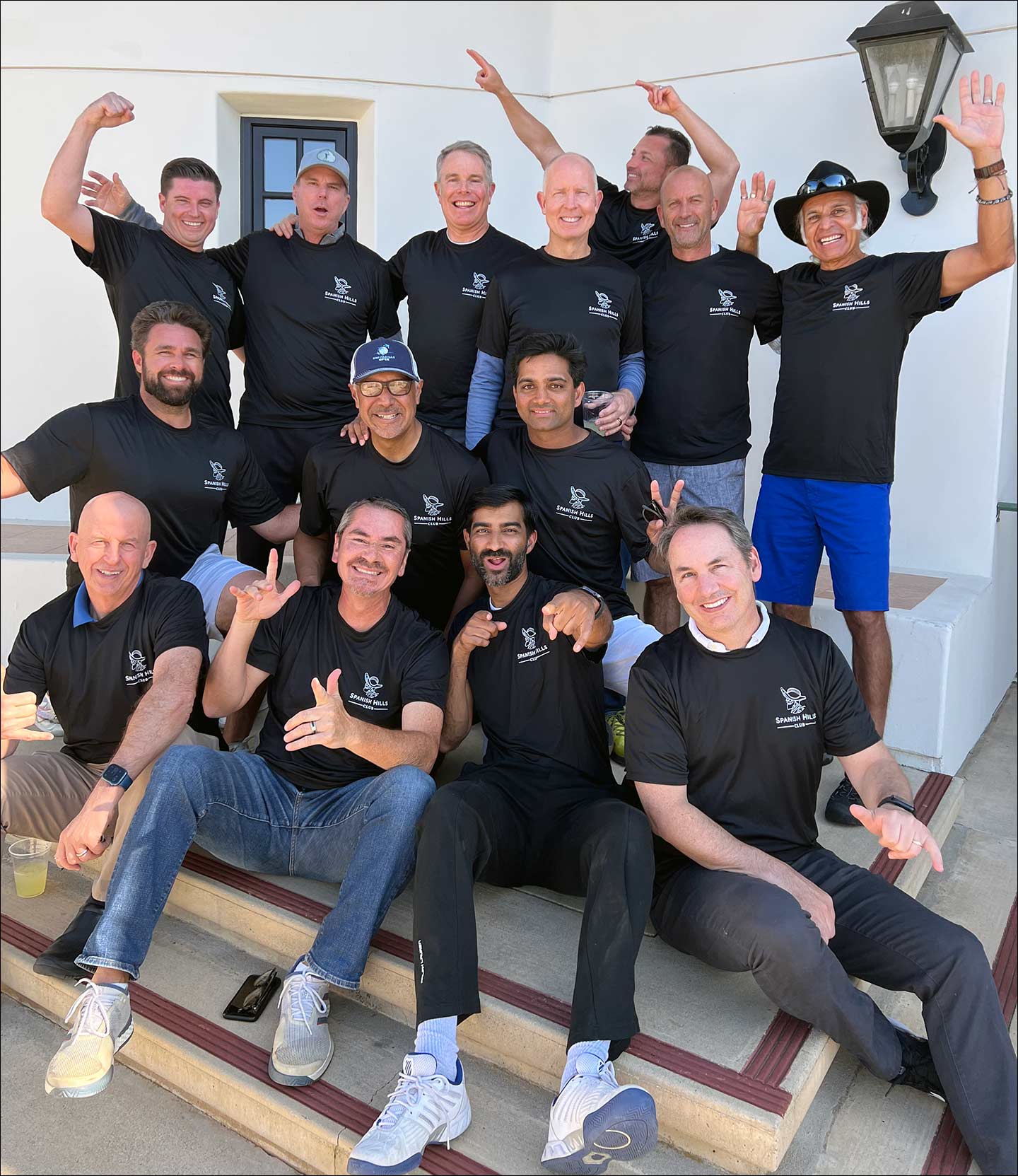
– and everyone in the above photo has suffered bitter defeats and serious injuries. Many of them. Each one of us can list a series of hard-fought, close losses which still rankle years later. We could go on and on about our defeats and we do. Then there is the plague of injuries: the pain and rehab when Rich tore a rotator cuff tendon, or when Frank pulled his Achilles tendon off the bone; they both required surgery and long months of healing and recovery. Then there is Jeff’s perpetually gimpy right ankle, and Shyam’s or Sean’s chronic tennis elbow issues… they have suffered them for months and months. Such setbacks come with the territory, and one learns to endure them and try to appreciate the “therapeutic value of adversity,” if at all possible. (What is the alternative? Gnashing your teeth and cursing the Fates? Shaking your fist at the tennis gods?) If veteran award-winning chefs get together and compare cuts and burns suffered in the kitchen through decades of cooking delicious meals, veteran athletes trade similar stories of serious physical injuries and bitter painful losses, amidst much athletic enjoyment, competitive success, and team friendship.
Like Arthur Ashe stated, the painful sting of losing is something all athletes must learn to make the most of – to endure, and to learn from. This is important. Any ol’ slob can be a good winner, but it takes practice and maturity to learn to be a good loser. And it is a consolation of aging that most older athletes can lose with relative aplomb – they have so much experience with it! In fact, one might encounter a veteran tennis player confronting a peer across the net at the end of a match who is throwing a mini-tantrum after a loss and asks them, “Dude! Really? What are you? 15-years old?”
This is the problem, EGO IS THE ENEMY,
Because EVERYONE LOSES.
